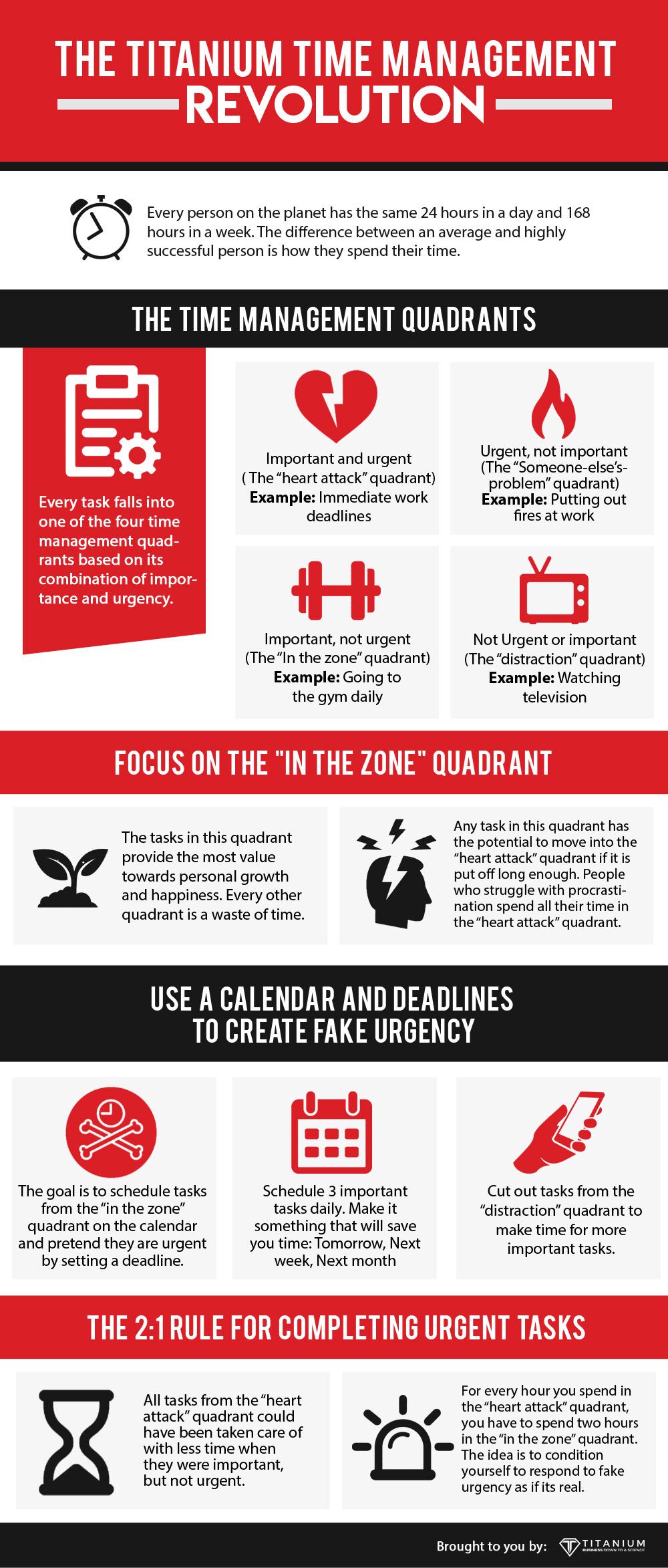One of The Most Effective Time Management Techniques is Creating Fake Urgency
You’re listening to the Apollo Podcast Network. This is Titanium Life Radio with your host, Peak performance speaker and business coach, Arman Sadeghi.
Alright, welcome back everyone. I know I did something to you this time that I hadn’t done before which I was teasing you with time management. I gave you half of it and I said you have to come back if you want the other half. So here we are and I’ve already talked to you about certain things in the last episode.
Today is about one of my favorite subjects, and if you haven’t listened to the last episode, I would highly recommend you go back. Listen to it now and then roll over to this one. If you have already listened to it, awesome! Let’s get started with a quick review of what we’ve already talked about.
Number 1 we said, look, time is the one thing we all have in common. We all have exactly the same number of hours in a day, days in a week, weeks in a year so on and so forth.
Number 2, we talked about this amazingly important concept of importance versus urgency. And what we said, because we all have the same amount of time, it’s really a matter of where we are spending our time.
And we said that there are four quadrants that we could be spending your time at. One quadrant is the stuff that is not important and is not urgent, which are distractions.
Another quadrant is stuff that feels urgent (like okay go, go, go you got to do this) but it’s not even important. Then you got this other quadrant that is urgent and it’s important. It’s got to happen now and it’s important. Then you’ve got this other quadrant, that’s like the magical quadrant.
It’s the important things that are not yet urgent. We’ve talked about the fact that this is the secret quadrant, which if you’re can spend time in this quadrant, you are going to be so much more efficient in life than everybody else you know.
And when you look at the people who’ve made the most headway in life, the most successful people in the world in any area, this is what they have mastered. Then we talked about this concept that I have introduced to you that I haven’t really talked about yet, this concept of creating fake urgency.

How to Improve Time Mangement Skills
So it turns out, creating fake urgency is one of my favorite time management techniques. It is the secret to spending more time doing important things that are not yet urgent. So, how do you create fake urgency? There are many, many different ways of doing it, but one of the ways you can create fake urgency is by scheduling things out.
When you schedule things on a calendar, it gives it a due date. I do this all the time, where I’ll take something that doesn’t really need to be done this week but then I put it on my calendar. And I put a 1-hour block to do whatever it is that I want to do. And then, now I lived by my calendar. Some of you don’t really use the calendar very well, for me I use my Google calendar as everything.
Like literally I tell people, if you put something on my Google calendar that says, drive to San Diego at 12 o’clock, I get in my car and I start driving to San Diego. I don’t question it. Now, most of you don’t use your calendar that closely but it’s fine. Ideally, after this episode, you’re going to use it more closely but even if you don’t, let me explain to you how this works.
What you’re doing is you’re putting something on the calendar that literally has no deadline. There’s no real deadline to do this thing but you’re putting it on your calendar. And what’s going to happen is when the time comes that thing pops up, then you create fake urgency.
Now as with many things you’re going to be tempted to push it off, so you might say ‘I’ll just do it tomorrow or the next day.’ Now the first rule is you never delete it in your calendar. Instead, you drag and drop it to a new timeslot so it never goes away.
And for many people, that’s a really, really big secret to making sure you get things done. Then you get into the habit of pushing things off endlessly. So what you’ve learned to do is utilizing other people. So if you set up appointments that involve other individuals, then you’re sort of forced to have to do it. In fact, I do this sometimes for my podcast.
Recording this podcast when you’re running all these different businesses, and you’re so busy doing different things, recording this podcast is difficult. But guess what I do, sometimes what I’ll do is I’ll schedule it with the engineer so he knows that I’m going to be doing it on a certain day.
And then I have no choice and today is one of those days. And today I had no choice because the engineer is like, ‘Okay, today I’m ready to do the podcast.’
Well great, okay let’s do it. I don’t really have time but now it’s urgent. Someone shows up at your door or you’re supposed to show up at someone else’s door, suddenly you have that urgency. And so what you want to do is you want to create all of this urgency. Some people say it’s amazing, some people look at this, ‘but that’s so stressful Arman, why would you want all that stress in your life?’
Why do we Need Time Management?
For example, every Tuesday I have date night with my wife. And some people are so stressful to know that you got to plan anything for Tuesday and Tuesday comes around and you got to do date night. And then Thursdays, I have Daddy day with my kids, let’s say. So when people look at that would become so much stress in your life. And then you’ve got all these things going on that are coming at you.
People knocking on your door, people calling your phone, scheduling calendar things, popping up. For example, you’re stressing out on the fact that, ‘Oh my gosh, I need to go to the gym.’ And people are like, who wants all that stress in your life? And that’s where we get to the next secret. See the secret here is, you want to create fake urgency in order to have fake stress so you don’t have to have real stress. It’s why it’s one of the most effective time management techniques.
See my friends, I don’t care what you say. But if you set up and automated withdrawal from your bank account to go into your investment account, for whether it’s $50, $500, $5000 or $50,000, I don’t care how much money you make and where it is.
You can start with $5 as far as I’m concerned. Even if you start with $5 and you have that going out monthly that will create some of that fake urgency. Some of you are going to say, well Arman it’s stressful to know that, that money is going to go out and I don’t have the money in. It creates stress.
Let me ask you a question, what’s more stressful, having to come up with $500 at the end of the month or at the beginning of the month to know that that’s what’s going to take to cover your monthly withdrawal? Or so let me ask you a question, what’s more stressful?
Knowing that an automated withdrawal from your bank account is going to go into your investment account in the amount of $500 and knowing you don’t have the money for that? And you’re a couple of a hundred dollars short or maybe you’re short the entire $500?
Is that more stressful today, or if you don’t save money and God forbid, 5 years from now, 10 years from now, maybe even 6 months from now, God forbid something happens, you lose your job, your business goes down, something happens in your life there’s a health issue with someone and you need money.
And now your family depending on you and you don’t have the money, what’s more stressful? I would say I’d rather have the small amount of fake stress every day, every month for the next 20 years but never have that real stress of knowing that for example, someone I love is going to lose their home and I can’t do something about it.
Or know that my family needs me for something and I can’t be there for them or something for myself that I absolutely need that I can’t financially afford it. So the fake urgency is the way you eliminate the real urgency. So you put things in place, like for example, you put deadlines in place.
I have a group of trainers right now who are going through this incredible Titanium Program, and they’re struggling with this. I mean some of them are like on the verge of dropping out of the program because they can’t handle all the deadlines.
But they don’t understand, all I’m doing is I’m creating fake urgency for them so they won’t have the real stress. In fact, multiple of them have come up to me and said ‘Arman, it’s so stressful. We’ve got like all these deadlines.’ What they don’t understand is that they always have those deadlines.
Break Down Tasks into Smaller, More Manageable Deadlines
But what I’ve done is I’ve taken this big, huge, ugly deadlines and I’ve converted them into 6 or 7 manageable smaller deadlines. So there’s the day they are supposed to pick for example the name of an article they’re supposed to write. Then a couple of days later, they’re supposed to come up with different parts of the article. Then they’re supposed to do a draft of the article.
And then they’re supposed to go create the science behind it and teaching guide. And then what they’re supposed to do is take it to the next level by creating the final draft of the article. And then they bring it all together by creating a 30-minute presentation on the topic. Now again, that seems really stressful but it’s not.
It’s all this fake stress over these little tiny steps. And when you look at my businesses, that’s how I run everything in my business. Everything is creating about this fake stress so I don’t have to worry about the real stress. That’s why what most people see is, they see me working my butt off and they would assume that I would have a lot of stress in my life. I really don’t.
I don’t let these things get to me because I realized that most of the stress in my life is something I am creating. And by the way, are there days where I can’t take it anymore? Of course there are! But guess what, on almost any given day of the week, I can literally leave the office and take the next 3 days off.
And there’s almost nothing in my calendar that is truly urgent whereas if you look at most other business owners, almost everything on their calendar is truly urgent. But for me, everything on my calendar is really bits and pieces of things that are not due for another 3 weeks, 4 weeks, 5 weeks sometimes 6 months, sometimes 5 years.
But I’m getting little bits and pieces of that out of the way now. And therefore, I don’t have that stress. So that is the incredible secret. Let me tell you, speaking from the perspective of the sciences, when you look at neuroscience.

The Human Brain is Hardwired for Survival
The human brain is designed to go towards things that are going to be survival things. Your survival instinct is the strongest instinct you have in your body. This is one of the most effective time management techniques because it hacks our need for survival.
So you utilize that survival instinct and believe it or not, a calendar pops up that says ‘you have to come up with a title for your article’. That triggers your survival response and that means you will get it done. Now what you have to do is you can’t battle it, you have to realize that these things even though you know are not really urgent, you have to see them as being urgent. And as you start doing these things that are not really urgent, but they’re important.
What’s going to happen is you’re going to start to have urgent things falling off your to-do list. So in the example of my trainers for example, what’s going to happen is before I remember the phone calls I used to get.
Like 4 pm on a Wednesday when they had to give their presentation Thursday morning, and they’re like ‘Arman, I’m so stressed.’ And they spend the next 6 hours on a Wednesday night preparing for a talk they’re going to give Thursday morning. Now, what would the results be?
One, a low-quality talk. Much lower quality than they could do if they had spent so much time and effort into it.
Number 2, they’re going to go through massive stress.
Number 3, if God forbid, they don’t go through this stuff, they’ll not going to be able to do the talk the next day. And if something goes wrong, forget it. So now they have all this little fake stress along the way which is not real but as a result of that, it avoids the 5 or 6 hours, they would have spent the night before.
Now getting a human being to see that, is a heck of a lot harder than it sounds. And as all of you are listening to this, I want you to understand this concept. So let’s move to the next thing.
Some Urgent Tasks Have to be Dealt With Immediately
What happens when you have to do something urgent? What happens when poop hits the fan, as I’d like to say? What happens when poop hits the fan and you got to do something? Well, when poop hits the fan, what you got to do is this. You got to say, Alright, I’m going to have to do this urgent thing. And by the way, this is something any of my employees will tell you.
I do this and I have put my money where my mouth is. I do this every single time and it blows people away. You come to me with something urgent, if you tell me the building is on fire if you tell me that there’s no money in the bank if you tell me anything that the customer needs something right now this second, this thing has gone wrong.
Time Management Techniques – The 2-1 Rule
You know something is blown up, anytime that someone comes up to me that is really, really urgent or when I have something really, really urgent that comes up. I have a rule, the 2 to 1 rule and sometimes I do the 3 to 1 rule. But let’s go with the 2 to 1 rule, you guys are beginners. I’ll start you off with the beginner level. It’s the 2-1 rule.
What that means is this. You are not, absolutely not permitted to spend time doing something urgent. And if you are going to do something urgent, then you must spend twice as much time as you invested in that urgent thing doing important things that we’ll make sure that thing never happens again.
What does that mean? Let’s say you’re one of the Titanium trainers, you didn’t spend enough time doing your stuff, you have to spend 2 hours on Wednesday preparing for your Thursday talk. Well guess what, if you’re going to spend 2 hours preparing for the Thursday talk then that means you’re going to have to spend an additional 4 hours that day.
You don’t get to be like, oh just push this part today, oh no, no, no. If you’re going to spend 2 hours, you’re going to have to spend 4 extra hours for a total of 6 hours. And someone’s going to say, but Arman, I don’t have 6 hours. Guess what my friend, you’re not going to get sleep are you? Oh you forgot about that. You are going to sleep. No sleep for you. But Arman it’s not urgent, I need to take care of the urgent thing. I’ve got this talk tomorrow.
My next talk is not for another 6 months. I don’t care. You are going to punish yourself. When I say punish yourself, this is not truly a punishment. This is sending what I call a shot across the hall. Letting your brain know, ‘If we don’t do the important things when they are important, when they become urgent they are going to hit the fan like nothing ever before.’ So now you have a choice.
You either spend 6 hours, 2 of which is going to be spent on the urgent task, 4 hours which will be spent on the important task. Or what you are going to do, let’s say well Arman I only have 3 hours. Well, you get to spend an hour on the urgent thing and you spend 2 hours on the important part.
The results aren’t going to be as good. And you say, but Arman I don’t want to have lower results. Well learn your damn lesson now and make sure this never happens again. The fact is in most cases, I’m crazy enough to do the important thing before the urgent thing.
Imagine that. That’s like the equivalent of this. And I did this in school sometimes. Imagine if you’re cramming for a midterm, and as you’re cramming for midterm your focus is on spending time studying for your final because you screwed up for the midterm. What are you kidding me, it’s the night before I have the midterm for let’s say, Physics and you want me to study for my Biology class?
Yes! Because if you’re cramming the night before, you must let your mind know that this is not going to be acceptable anymore. And imagine if you start doing these by the way folks. So as you listen to this, I want you to realize this is a time management system that actually works. This is not some BS checklist system, okay? I can give you all of those things people come to me for time management.
And they are always like, so what’s your time management system? And they are expecting me to give them some checklist. It doesn’t matter, use a piece of paper, use the reminders app on your iPhone, use whatever you want, it makes no difference.
They all work. But really none of them work unless you understand these concepts that I’m sharing with you today. So what I want you to understand is that the secret to all of this, is you’ve got to get out of the urgent things and you’ve got to get to the important things.
Why Humans Spend Time in The Other Time Management Quadrants
So finally, let me bring all of this together for you and explain to you why it is that human beings spend time on the other two quadrants. So far I’ve only really explained to you 2 of them.
One is the heart attack quadrant; it’s the things that are urgent and important. The next one is the important quadrant. That’s the stuff that if you do, you will not have urgent and important things coming up later. So that’s the equivalent of investing in yourself, investing in your business, investing financially, working out, eating healthy.
Those are the things that are in the zone, that’s why that quadrant’s called ‘the zone.’ So you’ve got the heart attack quadrant that where things are urgent and important. Yes, you’ve got a heart attack you better get to the hospital. But I highly suggest that on the way to the hospital, you stop at the gym put thirty minutes of exercise in.
Obviously, that’s not an option. So guess what, you might want to put in 30 minutes of exercise after you get through the whole thing. But the bottom line is, you got to make sure you’re doing that. So now there are these two other quadrants, why would anyone spend time on doing things that are urgent and not even important?
You’re going to say, well Arman I never do that. No, you’re wrong because if you’re spending time on things that are urgent and important in the heart attack quadrant, what starts happening after a while is that you are spending so much time there.
Do Not Let Others Control Your Time
That is really hard to distinguish, what’s actually important and what’s just urgent. And so what’s starts happening is you start doing all this other stuff, that’s not even really urgent but it feels urgent to you.
Part of the time is because it’s something that someone else’s problem and they’re putting on you. So it’s important for them and it’s urgent for them but what they’ve done is they’ve transferred the urgency over to you. So now even though it’s not really truly important for you, it’s become urgent for you. And other times, it’s just things that look urgent. You start doing all this stuff, and it’s like, ‘why are you doing that?’
I don’t know but I got to do it. So you stop, you take a step back and you breathe. Focus on the important things. And if you’re spending very little time doing urgent things, you sure as heck not going to take care of something that’s urgent for someone else. And by the way, as someone with hundreds of employees, I can tell you often, I do have to deal with someone else’s urgent problems.
But guess what I do, I make them suffer. How do I make them suffer? I sit their butt down and I’m going to say, ‘Alright, if we’re going to work on this urgent thing, one we’re going to work on it together. And two, we’re going to apply the 3-1 rule.’ Yeah, when I talk to them it’s the 3-1 rule. We’re going to spend 3 hours for every hour we spend on this thing doing the important stuff. And guess what, they learn their lesson pretty darn quickly and they know not to come to me with their urgent problems.

Stay Out of The Quadrant of Distraction
So finally, there’s the last one, stuff that’s not important and it’s not urgent. What are these things? This is called the quadrant of distraction. Why would you ever do things like watch random television? Why would people do things in the quadrant of distraction? Well the reason they do it, is because of the fact that when you spend so much time doing urgent things, your body and your mind literally get exhausted.
And from that exhaustion, you have to escape somewhere. And guess where you’ll escape to, you escape to the quadrant of distraction. Watching television, eating a bunch of junk food, landing on the couch, being lazy, doing things that aren’t productive, oversleeping, doing all of those things are way to disconnect from the reality of your life and especially if you have a hard time waking up in the morning.
I can tell you on the days that I’ve got a lot of urgent things to do; it’s very hard to wake up in the morning. On the days where I have nothing but important things to do, it’s actually nowhere near as hard because I know what I’ve got to do and I know they are not urgent. So why wake up knowing it’s a choice, not something someone’s forcing me not to do.
Alright, so let’s bring all of this together. The secret to time management is understanding everyone has the same amount of time in the day, it’s just a matter of deciding where we spend that time. Now at the end of this episode, you guys are going to get a little treat. We’re going to start doing this thing which is a 1-minute YouTube video that goes along with each one of these episodes. So we’re going to record that 1-minute video, and we’re going to let you guys listen in.
Hey, I love you all. I hope you have an amazing, amazing day today and I want you to go out there and I want you to please apply these things in your everyday life. And by the way, if you’ve never seen me in person and you want to see what I look like while I’m doing these videos, the 1-minute video is actually going up before the Podcast goes up. So go check it out, alright. I love you all and always remember please lead with your heart.
Hey everybody out there in YouTube, here is my one minute secret to spending more time in the zone. Doing things that are important and not yet urgent.
This is part of a 2-part series in my podcast, Time Management. This is for the 2nd part. So here’s the secret to spending time doing things that are important. See as human beings, our body; our neuroscience makes us do things for survival which means we’re programmed to do the things that are for survival. And those are the things that are urgent. Unfortunately, not the things that are important. So what you’ve got to do is you’ve got to trick the system. You trick the system by coming up with what I call fake urgency.
Create reasons and things that you have to do and people with whom you have to do some of those things that you don’t really have to do. But what that does, is it forces you doing the things that are actually important but they’re not yet urgent. By doing this, you are going to have a massively better understanding of time management.
And by the way, I spend 20 minutes talking about this on my podcast, Titanium Life, so go check that out right now. Two amazing episodes, I would not miss. If you want to master time management, have an awesome day. By the way, to find my YouTube channel just go to youtube.com/titaniumsuccess or just type in ‘Titanium Success YouTube channel’ and it will come up. Go check it out; there are some cool videos on there.




